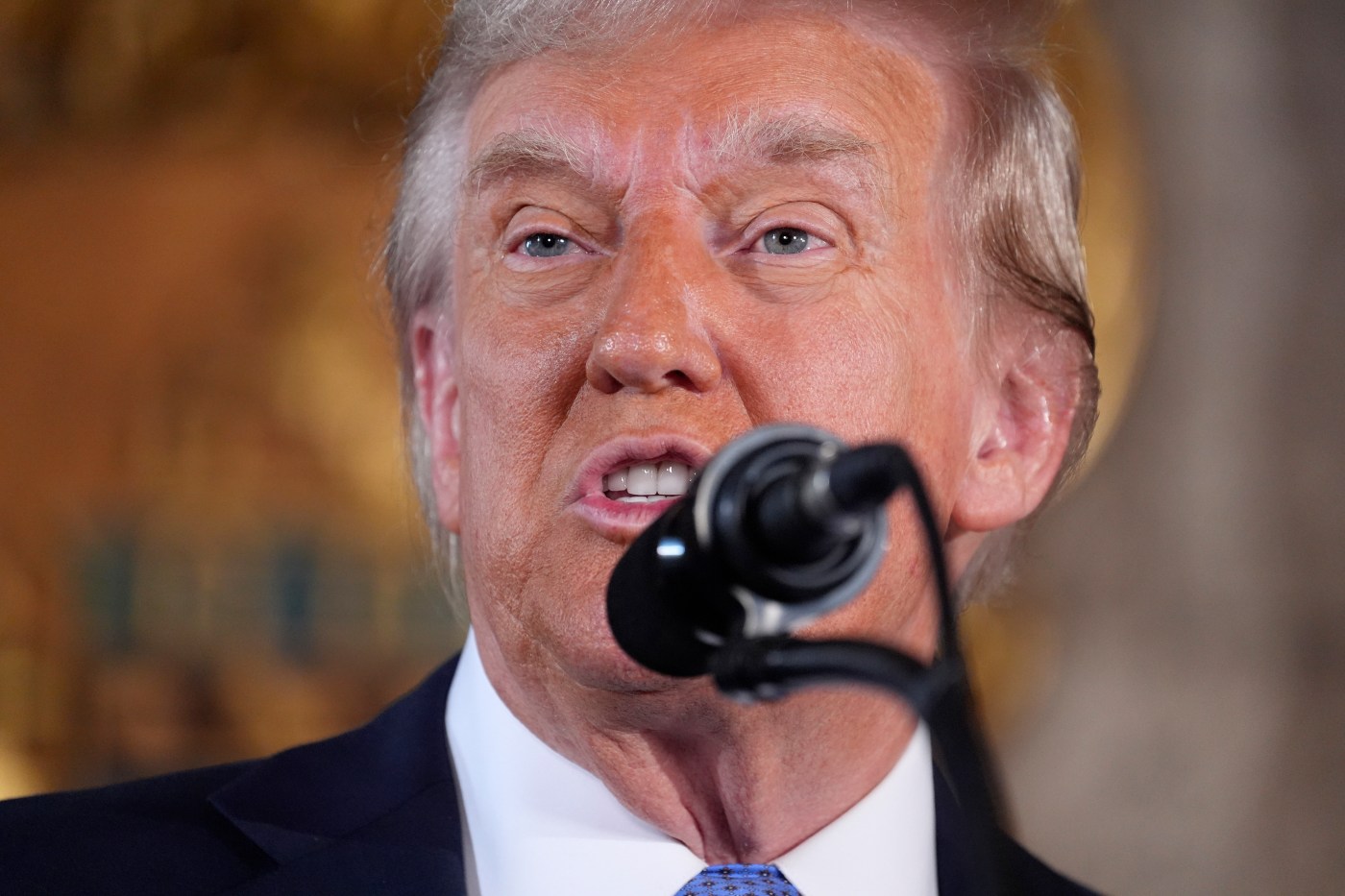
Donald Trump looms large over Beacon Hill with new legislative session set to start
President-elect Donald Trump’s return to the White House is casting a long shadow over Beacon Hill, where lawmakers on both sides of the aisle say they are preparing to react to his policies on immigration, taxation, energy, and budgeting in the new legislative session.
Pols in Massachusetts are scheduled to return to work for the 2025-2026 session in January and those in the Beacon Hill orbit ticket off the litany of areas Trump has said he wants to wade into as top issues the Legislature here will have to deal with come the new year.
Chief among them is the interaction between federal immigration authorities and local enforcement amidst Trump’s pledge to conduct mass deportations in part by invoking a 1798 law that allows the president to deport noncitizens of a country the United States is at war with.
But keen observers and policy analysts have also pointed to the twice-impeached president and convicted felon’s promise to cut domestic spending, which would have major impacts on Massachusetts’ balance sheets, and the continued cost of state-run shelters.
Immigration and mass deportations
Trump made immigration a key part of his campaign for president, railing against undocumented people and promising his supporters he would enact major reforms to the federal immigration system.
Gov. Maura Healey and Boston Mayor Michelle Wu have already refused to order state and local police to participate in any large-scale deportation efforts run by the incoming Trump administration.
Their snub is based on a 2017 Supreme Judicial Court decision that bars local law enforcement officers from detaining a person who is wanted solely on immigration violations, including deportations ordered by Immigrations and Customs Enforcement without a criminal warrant.
The state’s top judges left it to lawmakers to establish whether police officers should have that authority. The ruling prompted a wave of unsuccessful bills at the State House.
State Sen. Ryan Fattman said Trump has thrust the issue back into the spotlight and he plans to file a bill in the upcoming legislative session that would grant local law enforcement the authority to detain people on immigration issues if they commit a certain set of crimes.
“The idea that federal law enforcement shows up in a court to detain somebody or at a prison and they’re a dangerous individual — they’re somebody who may have attempted to rape somebody, traffic drugs — and that we have politicians who say ‘we’re going to put up fences to stop those people’ is just incredibly unjust, unsafe, and unreasonable,” the Sutton Republican said.
Top Republicans in the House and Senate filed a bill in October that would have done the same thing but it has not moved since and is likely to fizzle out with only days before legislators end the 2023-2024 session.
Democrats also view the looming threat of mass deportations as a reason to act.
Sen. Jamie Eldridge, a Marlborough Democrat, has for several years tried to push forward legislation on the opposite end of what Fattman and other Republicans want.
Dubbed the “Safe Communities Act,” the bill from Eldridge would limit cooperation between federal immigration authorities and local law enforcement. Whether Trump’s rhetoric around immigration will hurt or help the proposal this coming session is “a very fair question,” Eldridge said.
“I think as far as the rank and file members of the Legislature and the Legislature in general, I think that is an open question about what the response will be. I just certainly have heard it from a lot of faith groups and constituents … to take action,” he told the Herald.
Cutting the federal budget
Trump made a vow to cut federal spending a central pillar of his campaign, even going so far as to tap billionaire Elon Musk and one-time presidential candidate Vivek Ramaswamy to lead an effort to slash the budget.
Musk has said he will be able to cut $2 trillion from the country’s balance sheet — a massive task that is sure to run into challenges from myriad interest groups and federal lawmakers on Capitol Hill.
Any change to federal spending could have huge implications for Massachusetts, said Doug Howgate of the Massachusetts Taxpayers Foundation.
If Trump targets federal support for Medicaid, one of the largest state programs that largely relies on dollars from Washington, Beacon Hill could find itself trying to plug a budget hole or cutting back services.
“If some of those revenues go away tomorrow, it’s not as simple as just flipping a switch to reduce the cost. That creates a big potential challenge for the budget,” Howgate told the Herald. “As I’m kind of forecasting the things that I’d be paying attention to if I was up on Beacon Hill, that would definitely be on top of my budget list.”
Jonathan Cohn, policy director at Progressive Mass, also pointed to the likelihood of cuts to the federal budget or situations in which “Republicans might try to put policy riders on federal funding to target funding for higher education or funding for transportation.”
“I think it will be important to make sure that we are raising the money that we need to cover what we’re doing now because we need to do more than what we’re doing now,” he said. “Even though the Legislature always hates talking about raising additional revenue, that is going to be a critical piece of the conversation if we see Washington cutting funding to Massachusetts.”
State-run emergency shelters
Legislators on Beacon Hill are still grappling with the inflated cost of running emergency shelters for local families and migrants even though the Healey administration spent less on the system in fiscal year 2024 than originally anticipated.
A $325 million line item in the state’s yearly budget ballooned to $856 million last fiscal year and is on track to surpass $1 billion in each of the next several fiscal years, according to Healey’s budget writers.
Republicans have hammered Democrats for what they argue is a “lack of fiscal discipline.”
“I think given the fact that other states now are looking to cooperate with the incoming Trump administration on the immigration situation, I think that here in Massachusetts, we could see those costs escalate even further,” MassGOP Chair Amy Carnevale said in an interview.
In an interview with the Herald, Gov. Maura Healey pledged the cost of running emergency shelters would decrease.
“It’s going to go down,” she said earlier this month. “This is not a permanent situation, and it certainly is not sustainable, which is why I felt comfortable making the policy decisions that I have made to ratchet down the numbers.”
Housing and affordability
Outside of reacting to Trump, lawmakers at the State House included affordable housing on their list of top topics for the next legislative session.
Sen. Lydia Edwards, who co-chairs the Legislature’s Housing Committee, said reforming brokers’ fees, inclusionary zoning, and direct support for first-time homebuyers are all on her to-do list.
The Boston Democrat also said the Beacon Hill pols are also anxiously awaiting a ruling from the Supreme Judicial Court on the MBTA Communities Act, a law that requires cities and towns near a transit hub to zone for multi-family housing.
“I can say I am waiting with bated breath to figure out what the court’s final decision is on the law,” she said.
Materials from the Associated Press were used in this report.
Gov. Maura Healey will need to adjust to the incoming administration in D.C. (Matt Stone/Boston Herald)
Mayor Michelle Wu will also need to cope with a GOP D.C. (Stuart Cahill/Boston Herald)
The migrant crisis is a top concern in the New Year. (AP Photo/Eugene Garcia, File)
How Boston and sanctuary cities work, or don’t work with ICE will be key in 2025. (Matt Stone/Boston Herald)
Home2 Suites by Hilton is closed to the public and is housing migrants. (Matt Stone/Boston Herald)


